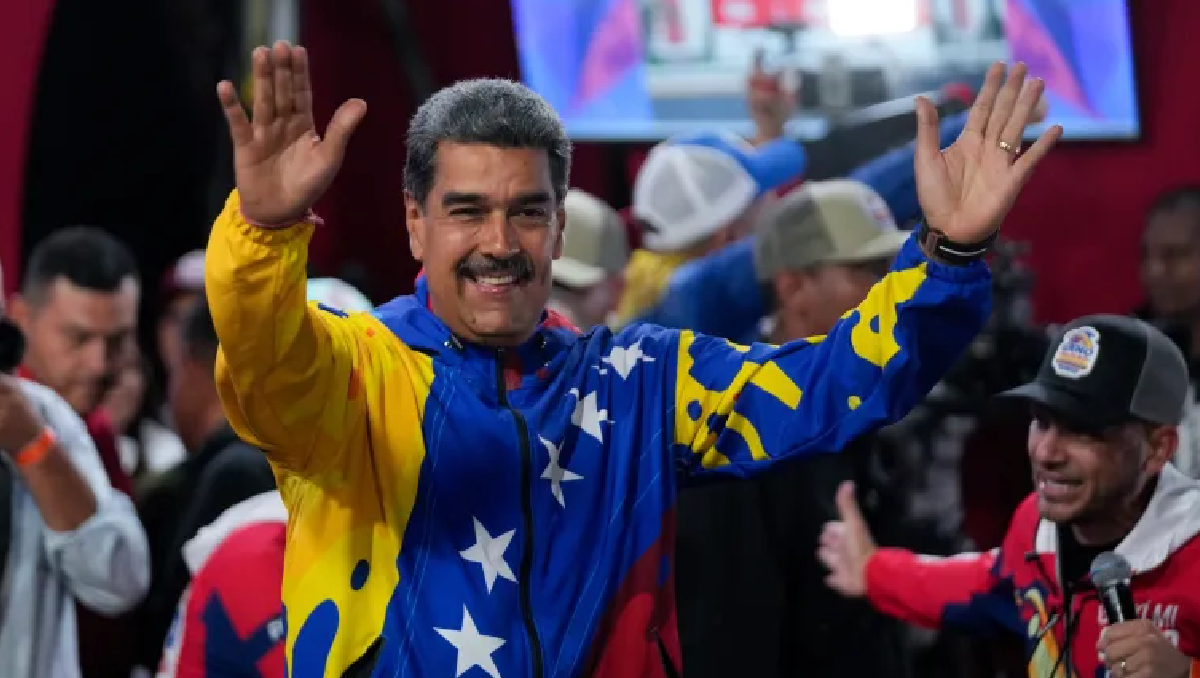- Home
- World News
- High Court Validates Maduro’s Reelection as Fraud Allegations Stir Tensions

High Court Validates Maduro’s Reelection as Fraud Allegations Stir Tensions
In a move that has deepened political divisions in Venezuela, the country’s highest court has confirmed the reelection of President Nicolás Maduro, despite widespread claims of electoral fraud. The decision, announced on [insert date], has sparked outrage among opposition leaders and raised concerns about the state of democracy in the crisis-hit nation.
Maduro’s victory in the [insert election date] election was initially met with skepticism from both domestic and international observers. Allegations of voter suppression, manipulation of results, and other irregularities cast a long shadow over the legitimacy of the election. However, Venezuela’s Supreme Tribunal of Justice (TSJ) dismissed these concerns, declaring Maduro the rightful winner.
The TSJ, widely seen as loyal to Maduro, argued that the opposition had failed to provide sufficient evidence to substantiate claims of widespread fraud. In a statement, the court emphasized that the electoral process had adhered to legal standards and that the results accurately reflected the will of the Venezuelan people.
Opposition leaders, however, were quick to condemn the ruling. Juan Guaidó, the most prominent opposition figure who has been recognized by several countries as Venezuela’s legitimate interim president, described the court’s decision as a “judicial coup” designed to cement Maduro’s grip on power. “This is a dark day for democracy in Venezuela,” Guaidó said in a televised address. “The people’s voice has been silenced, and the regime continues to cling to power through illegal means.”
International reactions have been equally critical. The United States, the European Union, and several Latin American countries have refused to recognize Maduro’s reelection, citing the same concerns over electoral integrity. The latest ruling is expected to further strain Venezuela’s relations with these countries, potentially leading to increased sanctions and diplomatic isolation.
For many Venezuelans, the court’s decision has only deepened the sense of despair and hopelessness that has gripped the country in recent years. Venezuela’s economic crisis, marked by hyperinflation, food shortages, and a collapsing healthcare system, has forced millions to flee the country in search of a better life. Those who remain face daily struggles for survival, with little hope that the political situation will improve.
Despite the controversy, Maduro remains defiant. In a televised address following the court’s ruling, he declared that justice had been served and that his government would continue to fight for the prosperity and sovereignty of Venezuela. “We have defeated the lies and the aggression,” Maduro said. “The people have spoken, and we will continue to work tirelessly for their well-being.”
The road ahead for Venezuela remains uncertain. With the opposition refusing to accept the court’s decision and the international community largely rejecting Maduro’s legitimacy, the country is likely to face continued political instability. As Venezuela’s leaders grapple with these challenges, the people are left to endure the ongoing crisis, with no clear resolution in sight.
This latest development marks a critical moment in Venezuela’s tumultuous political history, and its impact will be felt for years to come.
The Supreme Tribunal of Justice’s decision to uphold Nicolás Maduro’s reelection despite allegations of electoral fraud is expected to have significant and far-reaching consequences for Venezuela’s international relations. Here’s how the ruling may impact the country’s standing on the global stage:
1. Deepening Diplomatic Isolation
Many Western nations, including the United States, members of the European Union, and a coalition of Latin American countries, have already refused to recognize Maduro’s legitimacy. This latest court ruling is likely to further isolate Venezuela diplomatically. Countries that oppose Maduro may intensify their diplomatic efforts to delegitimize his government, potentially leading to the withdrawal of ambassadors, the closure of embassies, or further downgrading of diplomatic ties.
2. Intensification of Economic Sanctions
The decision could trigger a new wave of economic sanctions from countries opposed to Maduro’s regime. The United States, in particular, has already imposed heavy sanctions on Venezuela, targeting the country’s oil industry, financial sector, and key government officials. In response to the court’s ruling, these sanctions could be expanded, putting even more pressure on Venezuela’s already struggling economy. The EU and other international actors might also consider new or expanded sanctions in an effort to force a political resolution.
3. Strengthening of International Alliances
Maduro’s government may seek to strengthen ties with countries that have supported his administration, such as Russia, China, Iran, and Turkey. These nations could offer financial, military, or political support as a counterbalance to the Western pressure. For instance, Russia and China, both of which have significant investments in Venezuela, might deepen their involvement, providing economic aid, loans, or military equipment in exchange for greater influence in the region.
4. Regional Instability
The court’s decision could exacerbate tensions within Latin America, particularly among countries in the region that are divided over how to handle the Venezuelan crisis. Nations that support Maduro, like Cuba and Bolivia, may rally around him, while those that oppose him, such as Brazil, Colombia, and Peru, may push for stronger regional action. This polarization could lead to increased diplomatic conflicts within regional organizations like the Organization of American States (OAS) and weaken efforts at regional cooperation.
5. Humanitarian Concerns and Migration Crisis
The political turmoil and continued economic collapse in Venezuela are likely to drive even more people to flee the country, exacerbating the already severe migration crisis in the region. Neighboring countries, especially Colombia, Brazil, and other Andean states, may struggle to cope with the influx of refugees, leading to strained resources and heightened tensions. International organizations like the United Nations may need to step up their efforts to provide humanitarian aid, while also navigating the complex political landscape.
6. Impact on Global Energy Markets
Venezuela, despite its economic troubles, remains one of the world’s largest oil reserves holders. The continuation of Maduro’s rule and the likely escalation of sanctions could further disrupt Venezuela’s oil production and exports. This instability could contribute to fluctuations in global oil prices, particularly if sanctions target Venezuela’s ability to sell oil on the international market. Countries reliant on Venezuelan oil may need to seek alternative suppliers, potentially leading to shifts in global energy alliances.
7. Strained Relations with Multilateral Institutions
The Maduro government’s continued defiance of democratic norms may lead to strained relations with multilateral institutions like the International Monetary Fund (IMF) and the World Bank, which have already distanced themselves from Venezuela. The country’s access to international financial aid and loans could be further restricted, exacerbating its economic woes. Moreover, the United Nations may face challenges in mediating the crisis, as its efforts could be hampered by geopolitical divisions among its member states.
In conclusion, the validation of Maduro’s reelection by Venezuela’s high court is poised to deepen the country’s international isolation, intensify economic and diplomatic pressures, and contribute to regional instability. As Venezuela navigates these challenges, its relationships with both allies and adversaries will be tested, with significant implications for the broader geopolitical landscape.
